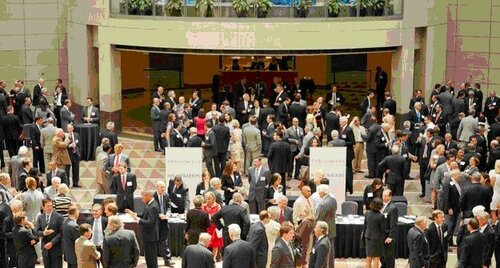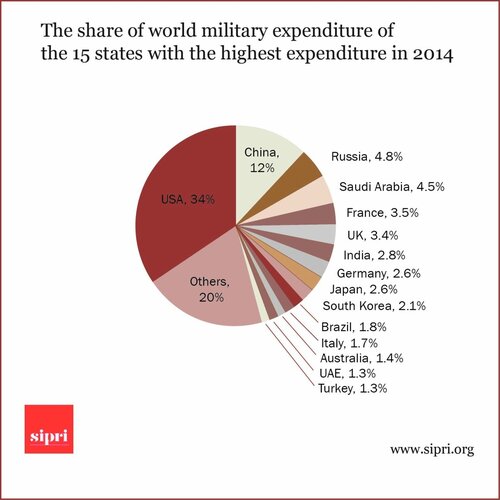In his January 2016 State of the Union Address, US President Barack Obama proudly declared that «We spend more on our military than the next eight nations combined», which is a startling and indeed repulsive boast.
What is less surprising is the US decision to refocus military spending, thus boosting shares in military industry companies. The Stockholm International Peace Research Institute (SIPRI) calculates that spending was higher than the next seven countries, rather than eight, but the message is still there:

Following the President’s statement, on February 2 his Defence Secretary Ashton Carter gave a speech on defence affairs at the Economic Club in Washington.

The Economic Club is proud of the fact that «For over 25 years [it] has provided a forum for prominent business and government leaders who have influenced economic and public policy both here and abroad. Members represent over 600 businesses and organizations [in Washington, DC] that are at the forefront of the private sector economy».
Having no sense of humour, Mr Carter would fail to see the wonderful irony in choosing that location to define his priorities in national military affairs; but its significance didn’t escape the stock exchange wheeler dealers, and shares in defence industry corporations were given a mighty hike all round.
After his comforting chat to executives of military-focused commercial enterprises, Reuters reported that Mr Carter «flew to the Naval Air Weapons Station China Lake in California to get updates on new high-end weapons being developed and tested there, including precision Long Range Anti-Ship Missiles built by Lockheed Martin Corp. He said the [defence] department would spend nearly $1 billion over the next five years to buy the new missiles».
The effect of this announcement on Lockheed’s shares was intriguing. At 10 a. m. on February 2, just before the Carter statement, they were at 208.87 – and by 2.30 p. m. on February 3 they had shot up to 213.53. It’s interesting to reflect on who might have made a profit.
As Forbes related, Mr Carter was «a consultant to defence contractors and when he went back to the Pentagon in 2009, he had to get a special waiver because of his work for companies like Mitre Corp, and Global Technology Partners, a defence consulting firm. As The Washington Times points out, that background seems to conflict with the president’s pledge to block the revolving door between federal employees and special-interest groups». Mr Carter was a Senior Partner in Global Technology, which «is a specialized group of investment professionals who have formed a strategic relationship with DLJ Merchant Banking Partners to acquire and invest in technology, defence, aerospace and related businesses worldwide». What goes around, comes around.
According to SIPRI, in 2014 (the most recent year for full figures) the US was responsible for 34 per cent of the world’s military spending.

It spent three times as much as China and over seven times as much as Russia. Certainly, a vast amount of US taxpayers’ money was squandered on the Pentagon’s futile war in Afghanistan, in which the US-NATO military grouping failed to defeat a few thousand raggy-baggy militants; but there is still an awful lot of cash available to buy hugely expensive new equipment of all sorts.
Given the Pentagon’s withdrawal of troops from Afghanistan (it has been calculated that each of the 100,000 armed forces personnel in that unfortunate country «cost an average of an eye-popping $2.1 million» a year), there should be massive reductions in military expenditure in 2016. But the drop in Mr Carter’s spending estimate is extremely modest – although it might eventually show that the US will spend only as much as the next five or six countries instead of the next seven or eight. Perhaps the next President will boast about that in her first State of the Union Speech.
Mr Carter told the Economic Club that «the Pentagon would seek a $582.7 billion budget next year and reshape spending priorities to reflect a new strategic environment marked by Russian assertiveness and the rise of Islamic State.» «Russian assertiveness»?
It is Mr Carter’s own country that is indulging in confrontational military «assertiveness» all around the world, in every region and ocean, using hundreds of military bases that are thousands of miles away from its own borders.
Mr Carter was reported as saying that «the Pentagon would ask for $3.4 billion to boost military training and exercises aimed at reassuring European countries concerned about Russia, which seized Ukraine's Crimean peninsula in 2014 and has worried NATO allies with its strategic bomber flights».
He ignores his own spokesman’s declaration that «We conduct B-52 [strategic nuclear bomber] flights in international air space [around China] all the time», and that the US operation «Polar Growl» of B-52 jaunts is aimed specifically against Russia in «demonstrating the credible and flexible ability of our strategic bomber force».

Polar Growl «saw B-52s complete simultaneous, round-trip sorties from Minot Air Force Base, North Dakota, and Barksdale Air Force Base, Louisiana, to the Arctic and North Sea regions».
Then «Obama said the request, a four-fold increase from last year's $789 million, would enable the United States to strengthen the US military posture in Europe. NATO Secretary-General Jens Stoltenberg called the move a ‘clear sign’ of the US commitment to European security».
US Defence Secretary Carter was reported as stating on February 2 in his speech on national defence that «the Pentagon plans to spend about $2 billion over the next five years to buy more Raytheon Company Tomahawk missiles and upgrade their capabilities, bringing the US inventory of the missiles to above 4,000».
At midday on February 2, Raytheon shares stood at 123.47. By 4 p.m. next day they had increased to 128.07.
America and its ardently anti-Russian NATO adherents cannot believe – refuse to believe – that Russia has no interest whatever in threatening «European security». Their stance is ludicrous.
Russia wants to trade with Europe. It wants mutual prosperity. Russia wants to flourish and thrive, economically and socially. Its government knows that it can’t achieve this objective for its people if it doesn’t have full, open, mutually beneficial trade with surrounding countries and with all of Europe.
It would be madness for Russia to indulge in military confrontation with its Baltic neighbours, who are important trading partners. Their economies are bound up with that of Russia, and it makes sense for them – and for Russia – to maintain cordial relations.
US-NATO warnings about threats to «European security» are a bogus justification for the war drums to be pounded and for the armed forces of US-NATO to be given even higher priority in their confrontational stance against Russia. And this is welcome news for the big spenders on military equipment in Washington where members of the Economic Club will be rejoicing in their wealth and ever-increasing profits. But they and the other warmongers had better be careful: what goes around, comes around.
Comments
Post a Comment